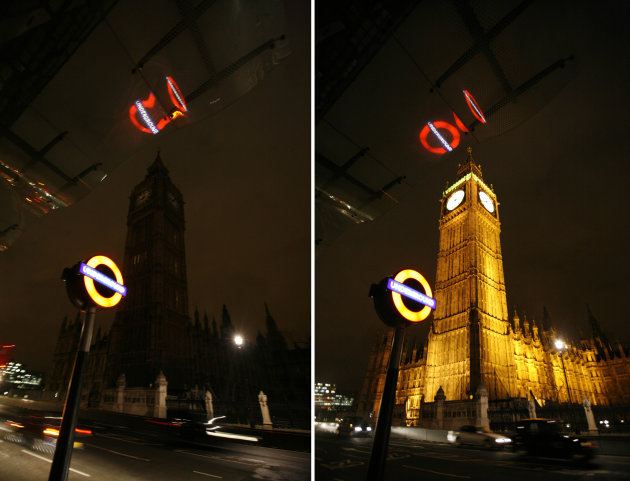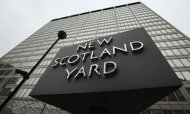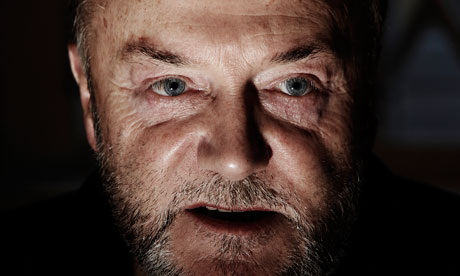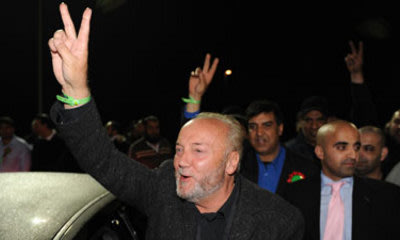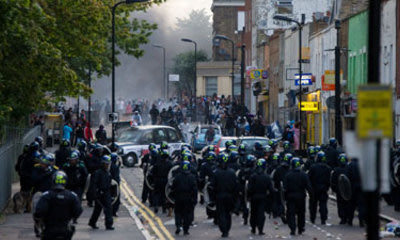LONDON (Reuters) - A cloud of explosive natural gas boiling up from the North Sea out of a leak at Total's evacuated Elgin platformforced another shutdown off the Scottish coast on Tuesday as the French firm warned it could take six months to halt the flow.
Dubbed "the well from hell" by an environmentalist who said the unusually high pressure of the undersea reservoirs made it especially hard to shut off, the loss of oil and gas output from Elgin - as well as the prospect of a big repair bill - helped drive Total's share price down six percent on the Paris bourse.
As Shell pulled its bigger Shearwater facility offline too and an air and sea exclusion zone was declared around the forlorn Elgin rig, 150 miles (250 km) east of Aberdeen, green campaigners denounced dangers in the technically challenging deep drilling that energy companies have undertaken around the globe to exploit the high prices created by insatiable demand.
The Elgin well, pumping some three percent of Britain's gas output from nearly four miles below the seabed, pushes the frontiers of technology and is one of the deepest, most highly pressurized, offshore natural gas fields in the world. It now sits empty following Sunday's emergency evacuation of 238 crew.
Total, which said the rupture of an unused reservoir above the main production source seemed to have been caused by its own engineers, is now looking at two main options to cut off the shimmering plume of gas rising above the sea: either drilling a relief well nearby, which could take six months, or - faster but possibly riskier - sending in engineers to "kill" the leak.
The firm concurred with British authorities which called the environmental impact from the plume of gas and a spreading sheen of light oil on the water "minimal", although environmental pollution experts said much of the gas "cocktail" would be either flammable or poisonous at close quarters. The thin film of oil should evaporate without the need to spray dispersants.
But two years after Britain's BP saw its reputation and value savaged by a blowout at its Deepwater Horizon rig in the Gulf of Mexico which caused the biggest U.S. oil spill on record, energy firms are sensitive to controversy about their ability to develop deep sea reserves. In responding to the Total leak, Greenpeace condemned new British government incentives for exploration in the deeper Atlantic waters west of Shetland.
TWO OPTIONS
"There are two options for intervening," David Hainsworth, health, safety and environment manager at Total Exploration and Production UK Ltd, told Reuters.
"One is drilling a relief well which could take about six months. The other is a platform intervention to kill the well.
"This would be a faster option," he added, saying a decision on how to tackle the problem would be taken in the coming days.
As well as flying in 10 to 20 specialist engineers, Total has enlisted the services of Wild Well Control, which was heavily involved in efforts to cap BP's Deepwater Horizon.
"We are exploring all the options and we are looking at what-if scenarios," Hainsworth said, while noting there was a chance nature alone would resolve the problem: "The well itself could die on its own," he said. "This is the dream option."
Frederic Hauge, the head of Bellona, a leading Norwegian environmental campaign group which closely monitors the oil industry across the North Sea, was unimpressed: "This is the well from hell," he said. "This problem is out of control."
Citing his organization's anonymous sources, Hauge said workers on the platform had battled for 14 hours to contain the leak before being forced to evacuate - and taking care not to let electrical plant or other stray sparks ignite an inferno.
"They saw the sea bubbling with gas under the platform," he told Reuters. "This is quite shocking.
"This situation is only going to get bigger and bigger."
Local gas prices firmed about one percent with the loss of Elgin, whose output was 9 million cubic metres per day (mcm/d), and of Shell's 11 mcm/d Shearwater, about four miles away, where some staff were pulled off and the company said it decided to shut down for maintenance four days ahead of schedule.
Total said Elgin also produces 60,000 barrels per day (bpd) of light crude oil, exported via the BP-operated Forties pipeline system. Shearwater's capacity is 90,000 bpd. Britain's total output last month was 1.09 million bpd.
A nearby Shell drilling rig was also shut down, while Total said it suspended drilling at its West Franklin site.
ENGINEERING WORK
Hainsworth said that some weeks ago Total engineers had decided to pump in mud to redundant piping on a gas reservoir which had been plugged about a year ago. This recent operation appeared to resulted in the escape of gas: "We believe the leak is coming out of the outer casing of the well," he said.
The leaking reservoir is above the production reservoir, which lies 6,000 metres - nearly four miles - below the seabed.
Britain's energy minister Charles Hendry sounded a note of confidence in the response: "Any leak we take very seriously and I think the right measures have been taken," he said.
"Procedures appear to have been followed properly."
He played down the oil slick, which is a light form known as condensate, spreading over the surface: "Some tonnes of condensate have escaped," he told Reuters. "The size of the sheen is one-sixteenth of the size of an Olympic swimming pool."
Shipping was ordered to come no closer than two miles from the Elgin platform and aircraft no nearer than three miles if they flew lower than 4,000 feet - effectively shutting out helicopters but not affecting airline traffic.
For Scotland's government, environment secretary Richard Loch head said: "Impact on the environment ... is minimal."
Scientists said the gas, flammable methane but containing poisonous hydrogen sulphide - familiar from the smell of rotten eggs - should disperse in the atmosphere. But it poses a risk to anyone close to the source, making capping the well complex.
Poison in the gas could also threaten fish and other marine life nearby, although the rate at which it dissipates in air and water meant it was not a significant threat to people on land.
Greenpeace used the accident to criticise new incentives offered by the British government for deep water drilling west of Shetland and called North Sea energy production dangerous to those working there and damaging to the environment.
The campaign group's Vicky Wyatt said the Total leak was "a reminder of the dangers that drilling for oil and gas pose to the lives of those working on rigs, and the huge damage that can be done to the environment".
But Martin Preston, a marine pollution expert from Britain's Liverpool University, said that while there appeared to be a "cocktail" of noxious and explosive material escaping into the air and water, the impact seemed much less serious than that of the Gulf of Mexico crude oil spill two years ago: "We're not talking about anything like that," Preston said.
Methane gas in high concentrations as it emerges would risk blowing up, hence the need to clear the area, while of hydrogen sulphide he noted: "If there's a lot of it being belched out, it's horribly poisonous." However, the gas decays rapidly in air and poses little threat beyond the immediate vicinity.
The surface oil slick formed by gas condensates should, Preston said, evaporate fairly quickly, particularly in the mild, breezy conditions on the North Sea at present.
Memories are still raw in the North Sea industry of the Piper Alpha platform fire 24 years ago, when 167 people were killed in the world's deadliest offshore oil disaster.
(Additional reporting by Gwladys Fouche in Olso, Muriel Boselli in Paris and Karolin Schaps, Kate Kelland and Henning Gloystein in London; Editing by Alastair Macdonald)
